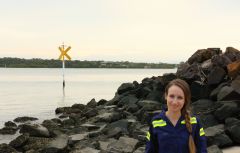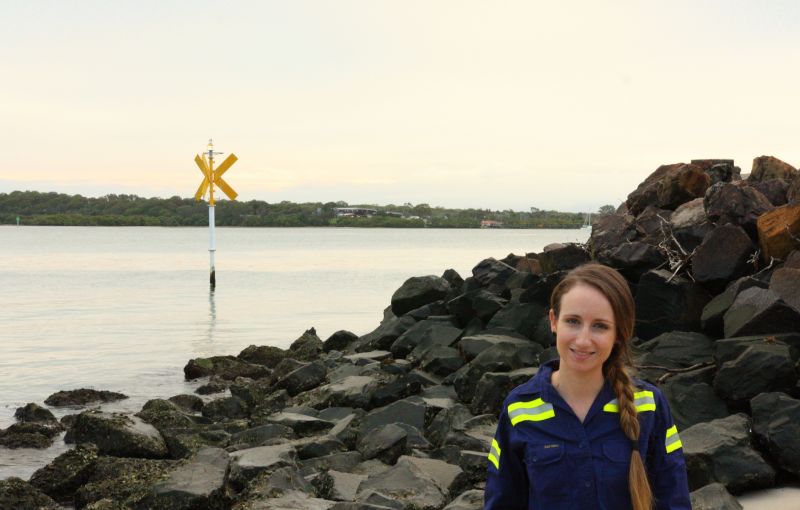Coastal engineer Jessica Ryan tells us about dredge plume modelling, being a woman in engineering and why she’s back at AMC for a teaching stint.
I grew up in Gladstone, Central Queensland, which is a city based around a large port. Hence I was exposed to lots of maritime activity as a child, and I did a fair bit of sailing when I was at school.
I always preferred subjects like maths and science at school, but I wasn’t as interested in typical types of engineering. It was only when I ran into the Australian Maritime College at a careers fair that I heard about ocean engineering for the first time, and it sounded right for me.
It was only when I ran into the Australian Maritime College at a careers fair that I heard about ocean engineering for the first time, and it sounded right for me.
I graduated from the Australian Maritime College in 2012 and began working as a coastal engineer for Sinclair Knight Merz (SKM), an engineering consultancy that was subsequently acquired by Jacobs, one of the world’s leading providers of technical, scientific and professional services.
My work is based in Brisbane, but Jacobs (with 54,000 staff) has offices all over the world. One of the things I like about the company is its global presence, which offers the opportunity to work in different places.
As a coastal engineer, I predominantly focus on two things: the design of coastal structures such as seawalls and breakwaters, and numerical modelling studies to assess hydrodynamic and wave conditions and investigate sediment transport processes.
Coastal engineers regularly work closely with various disciplines, for example maritime structures engineers, marine scientists, and geotechnical engineers. On top of that, there’s plenty of contact with clients.
One project I really enjoyed was for a client who was seeking to extend an existing wharf to provide access for cruise ships to berth safely at the port. Given the length and draft of such vessels, dredging would be required to allow for safe manoeuvring to and from berth.
Dredging is the process of removing sediment from the seabed, which is often done using digging buckets or suction mechanisms that drag along the ground to remove sediment. During this process, sediment can be spilt into the water column, which can result in the generation of sediment plumes that have the potential to harm the marine environment.
As a working engineer, it is great to be able to demonstrate to the students what you can achieve with an AMC degree.
To help the client understand how to dredge efficiently whilst meeting marine water quality guidelines, we generated a sediment plume dispersion model incorporating the effects of wind, waves and currents at the site.
Using this, the client could select the most appropriate methodology for dredging, ensuring efficiency while meeting environmental guidelines.
I was one of the first AMC graduates to go to Jacobs, but there have been a number since me. Jacobs is keen to develop links between industry and academia; thanks to this, I’m back at AMC this semester to teach its coastal engineering unit.
I love working as an engineer, but teaching is such a different challenge (not least lecturing for four hours a day), and I enjoy the contrast.
As a working engineer, it is great to be able to demonstrate to the students what you can achieve with an AMC degree – and show that an ocean engineering degree is definitely not just about offshore engineering and the oil and gas industry.
In an environment that’s still quite male dominated, I haven’t felt at all disadvantaged. In fact at Jacobs I’ve only been encouraged and promoted. I think it’s definitely a good field to be in as a woman.
In an environment that’s still quite male dominated, I haven’t felt at all disadvantaged. In fact at Jacobs I’ve only been encouraged and promoted. I think it’s definitely a good field to be in as a woman.
Published on: 05 Jun 2017

